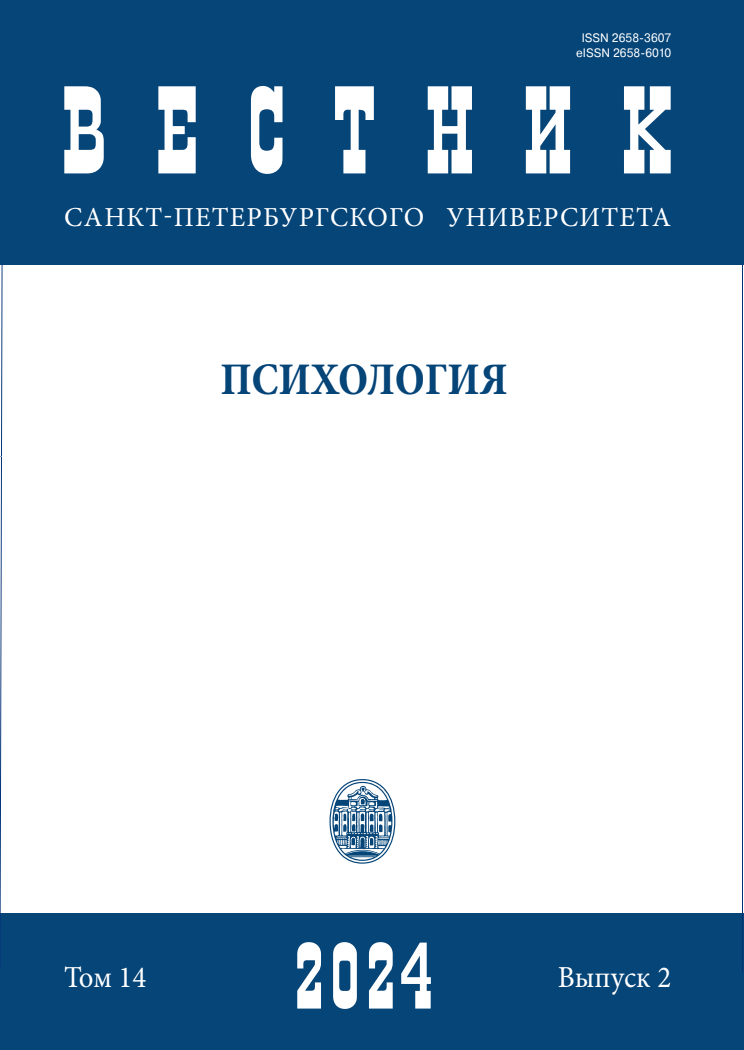Адаптация русскоязычной версии опросника «Восприятие старения» Aging Perceptions Questionnaire (APQ)
DOI:
https://doi.org/10.21638/spbu16.2024.202Аннотация
Работа посвящена адаптации опросника «Восприятие старения» на основе англоязычной анкеты восприятия старения Aging Perceptions Questionnaire (APQ). Современное научное знание обладает существенным массивом данных в области психологии старения, интерес к которой не угасает, а процесс старения исследуется с различных сторон. Ученые чаще обращаются к проблеме конструирования продуктивной старости, планирование которой рекомендуется начинать на более ранних этапах жизни. Результаты исследований указывают на то, что позитивное восприятие старения выступает предиктором качества жизни в старости, способствует различным аспектам здоровья в пожилом возрасте. В этой связи встает вопрос о психодиагностическом инструментарии, позволяющем выявлять специфику восприятия старения. Несмотря на то, что в настоящее время встречаются работы по данной проблеме, вариант опросника, позволяющего оценить восприятие старения на российской выборке, отсутствует. В статье представлены результаты психометрической проверки надежности и конструктной валидности англоязычной версии анкеты восприятия старения APQ. В исследовании приняли участие 229 человек в возрасте от 29 до 68 лет. Надежность оценивалась путем подсчета коэффициента α Кронбаха и показала внутреннюю согласованность и воспроизводимость шкал. Для проверки конвергентной валидности использовались: опросник «Профилактика здорового образа жизни», шкала психологического благополучия К. Рифф, австралийская анкета «Здоровое старение», «Шкалы позитивного аффекта и негативного аффекта». В результате эксплораторного факторного анализа были выделены шесть шкал: «Негативные “последствия” старения», «Позитивный контроль», «Эмоциональные представления», «Нестабильный образ старости», «Позитивные “последствия” старения», «Негативный контроль». Анализ конвергентной валидности показал связь выделенных шкал с показателями психологического и физического здоровья. Опросник «восприятие старения» является простым и гибким методом оценки образа старения.
Ключевые слова:
восприятие старения, адаптация опросника, шкалы восприятия старения, детерминация причин старения, обусловленные старением изменения, проявления старения, Aging Perceptions Questionnaire
Скачивания
Библиографические ссылки
References
Barker, M., O’Hanlon, A., McGee, H. M., Hickey, A., Conroy, R. M. (2007). Cross-sectional validation of the Aging Perceptions Questionnaire: A multidimensional instrument for assessing self-perceptions of aging. BMC Geriatrics, 7 (9). https://doi.org/10.1186/1471-2318-7-9
Загрузки
Опубликован
Как цитировать
Выпуск
Раздел
Лицензия
Статьи журнала «Вестник Санкт-Петербургского университета. Психология» находятся в открытом доступе и распространяются в соответствии с условиями Лицензионного Договора с Санкт-Петербургским государственным университетом, который бесплатно предоставляет авторам неограниченное распространение и самостоятельное архивирование.




